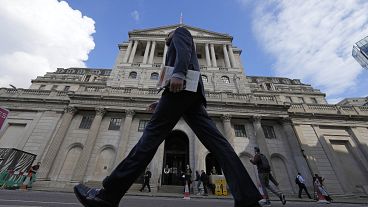Ahead of the Bank of England’s interest rate decision on Thursday, new data shows the economy is cooling.
The pay growth recorded in the UK between August and October of this year is the slowest seen in almost two years, according to data released by the Office for National Statistics (ONS) on Tuesday.
During this quarter, wages excluding bonuses showed a 7.3% annual rise, yet the rate of growth was lower than that seen in July to September, when the annual increase came in at 7.8%.
The most recent figures are more promising than expected, as analysts predicted that wage growth would rise by 7.4% from August to October.
“As the economy has cooled, so has that record pace of wage growth which had so troubled MPC members,” Danni Hewson, head of financial analysis at AJ Bell, said.
In September, the Monetary Policy Committee (MPC) at the Bank of England (BOE) decided to hold interest rates steady after 14 consecutive rate hikes.
The current base rate of 5.25% is at its highest level since 2008, meaning the Bank will no doubt be pleased to see the effects of this policy kicking in.
Interest rates are used to tackle inflation as borrowing becomes more expensive, meaning businesses and individuals scale back their spending.
Looking ahead to the next rate decision due on Thursday, Danni Hewson rejects the idea that interest rates will be cut: “Another no-change decision looks almost nailed on.”
Whilst wage inflation is slowing, it is still rising faster than general inflation, as once you account for rising prices, wages showed an annual increase of 1.2% between August and October.
This suggests that cutting rates immediately could undo progress made by the BOE, a view expressed by governor Andrew Bailey: “Rates are likely to need to remain at these levels for an extended period to bring inflation back to target on a sustained basis.”
Adding to slowing wage inflation, the ONS has also noted a fall in UK job vacancies.
Between September and November, there were around 45,000 fewer available positions than in the period from June to August.
This is an approximate decrease of around 4.5%, and it also marks the 17th consecutive drop seen for job vacancies, the longest period of decline on record.
That said, due to Brexit and the effects of Covid-19, job vacancies soared between 2020 and 2022, meaning that current vacancies are still higher than pre-pandemic levels.
The industry sectors showing the largest annual drops in the number of vacancies were human health and social work, and professional, scientific and technical activities, which both fell by 34,000 compared to the same period last year.



